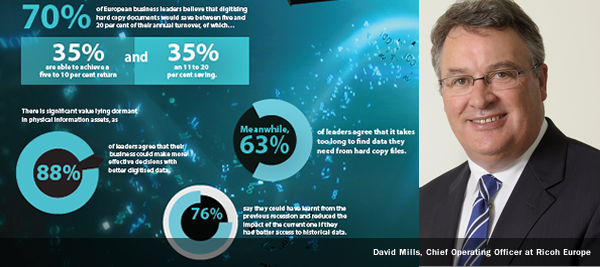70 per cent of European business leaders believe that digitising hard copy documents would save between five and 20 per cent of their annual turnover.
New research commissioned by Ricoh Europe illustrates the benefits to European businesses of tackling the ‘bigger data’ opportunity – the digitisation of business critical, hard copy documents for business decision-making. Leaders clearly understand that significant business value lies locked away in paper documents, with 88 per cent agreeing that digitising and unlocking data from physical documents would improve business decision-making.
David Mills, Chief Operating Officer at Ricoh Europe said: “Leaders are aware that the business opportunities of big data go beyond the digital and must address the physical documents that also hold critical business insights. With leaders under pressure to make the right decisions to steer their businesses out of the downturn, we found overwhelming agreement that digitising and unlocking data from physical documents would improve business decision-making.”
“Business leaders still foresee volumes of hard copy information growing in the workplace. It is clear that we are now in the era of bigger data and our ability to easily access information, whether digital or physical, is essential as organisations accelerate their digital transformation and drive business growth.”
The research reveals that over 50 per cent of organisations still have between five and ten years’ worth of information stored only in hard copy. This is not only having an impact on business decision-making but also productivity and the bottom line. The majority of leaders (63 per cent) agree that it takes too long to find the information they need from hard copy files. Data that is fragmented across filing cabinets, warehouses, basements and files held by employees, often comes at a significant price. Rental space is at its highest in London, with annual occupancy costs the most expensive in the world. ”
While the initial focus of big data initiatives has been on digital data sources, there is growing recognition from business leaders that there is significant value lying dormant in physical information assets. 76 per cent said they could have learnt from the previous recession and reduced the impact of the current one if they had better access to historical data.
As a result, over three quarters of respondents have spent more time digitising historical data during the economic downturn. HR, finance and procurement functions continue to rely on paper-based processes in many cases, and often compliance dictates how certain hard copy data, such as medical records, must be retained. However, the digitisation of hard copy documents is now becoming a business priority for organisations. Six out of ten respondents (57 per cent) expect to have completely digitised these assets within the next three years.
Mills added: “The first step to managing bigger data is to eliminate the mystery surrounding it. There is one real outcome that matters. That’s collecting, analysing and acting on the high-quality information available, and using it to provide a better service to clients, winning their loyalty and continued custom. Valuable business insight existed long before the big data boom, so it is essential to continue to look beyond digital information.”
“Significant trends and insights from historical data, for example archived in hard copy, can help to tell the full story and are essential for businesses in the future. The economic crisis has underlined the importance to the organisation of gaining a 360-degree view into the environment around them, both in the past and present. It’s therefore vital that businesses harvest all of their critical information to gain competitive edge, and enhance business decision making in the future.”
For More Information:
View Ricoh’s video on the true value of digitising business critical documents.
For more insights into the impacts of technology lead change visit www.ricoh-europe.com/thoughtleadership.
Research conducted by Coleman Parkes Research, May-June 2013
Research conducted by Cushman & Wakefield, 2013: http://www.cushmanwakefield.com/en/research-and-insight/2013/office-space-across-the-world-2013/
